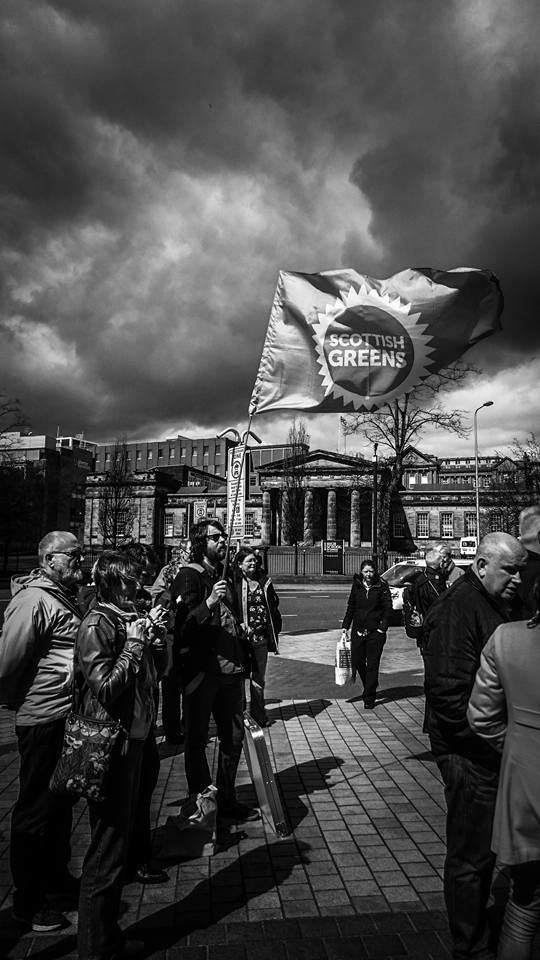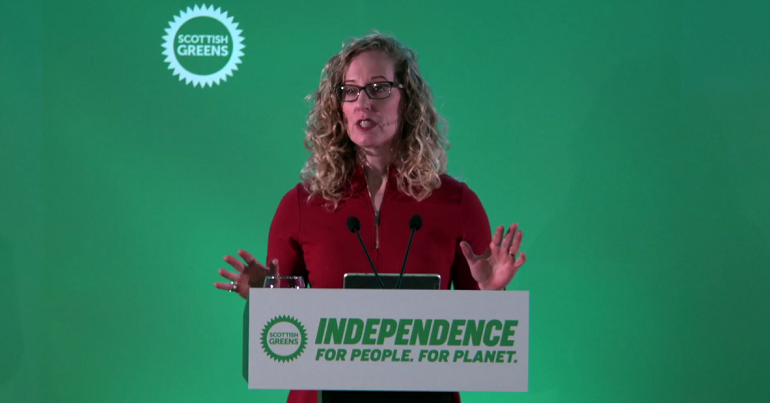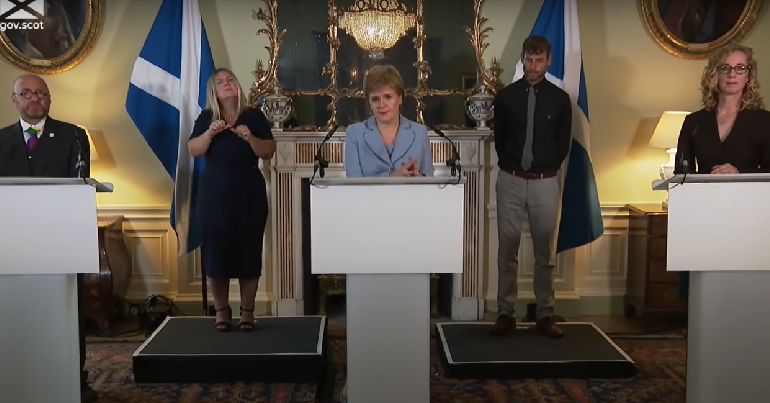Now is the time for Scotland to be bold: why I’m voting Green
As it approaches its fifth Holyrood election, Scotland faces five huge questions.
The first is simple: should we be an independent country? And if so, how can we progress our journey in that direction?
The first answer is equally simple: “yes”. Scotland should be independent because the British state is an anachronism built to run a brutal empire, not a democratic government designed to administer a modern country. Scotland should be independent because the future cannot be left to the market, and government intervention is more effective where it is more local, more subtle. Scotland should be independent because England cannot liberate itself from the history or present of the British state, and the path to justice doesn’t run through Westminster. I could go on.
Neal Ascherson once observed that you are no more likely to get democratic socialism from the British state than you are to get milk from a vulture. From the Iraq war to the Panama Papers, privatisation to financialisation, this has only become clearer in recent years.
For all the protests that this election shouldn’t just be about independence, it’s perfectly rational that many on both sides think that it is, at least in part. Whilst a second referendum may be unlikely in the coming five years, the make-up of the parliament and the power of different political forces in it will clearly have an impact on whether and at what speed the journey to independence continues. For me, Green proposals on independence – including an independent currency and an elected head of state – were always the most appealing, and it’s key that those ideas remain in the mix as the debate moves forward.
The second question comes in many forms: why, in one of the richest societies in human history, do so many still live in such poverty? How have we ended up as one of the most unequal countries in the Western world? How can we build an economy for the many and not the few? And how can we avoid stumbling into a future financial crash?
Like the centre of a spider’s web, these are questions to which the answer can be approached along any of many sticky lines. We could talk about how we lurk in the shadow of our once vast empire. We could discuss the destruction of manufacturing as our country is flogged to city speculators in the Great British Asset Striptease. We could investigate our tax-haven overseas territories and the deregulation of the banks. We could think about the advance of technology and the automation of jobs, the flow of wealth to the rich as trade unions are crushed and the public sphere privatised, the globalisation of capital and the resulting growth of corporate power, the increasing precarity of work and the way that the fast inflating housing market sucks in all our savings and takes it on a conveyer belt to the very richest, away from investment in the productive economy.
At the centre, though, is something fairly simple. A relatively small number of very rich people have managed to accumulate over the last 40 years increasing amounts of wealth and power, which they have used to secure more and more wealth and power. Scotland’s richest four families now have significantly more wealth than her poorest million people.
Within the powers that Holyrood has, there is much that could be done to improve matters. First, the government must try to stop the inflation of the housing bubble, which sucks in ever-more of the country’s wealth, using it to make houses more expensive rather than do anything productive: enriching speculators, mortgage sellers and equity gamblers at the cost of makers and inventors; carers and maintainers. Things Holyrood has the powers to do include:
- introducing nation-wide rent controls. As well as ending the spiralling costs of tenents, this would discourage buy-to-let investors and so take some heat out of the market;
- build significant amounts of new social housing (not just ‘affordable’ private sector housing) which as well as providing new homes for those who need them would ease pressure on prices for everyone;
- end land banking and restrict prices by allowing those who wish to use sites which are zoned for building but not being used for it to buy the land at the price it had before it was zoned for building (‘a land price freeze’, as done in Germany);
- replace the council tax with a proper, fairer tax on land and property values;
- reform land ownership laws so more and more of Scotland’s turf can be taken on democratically by the communities who live on it.
These are all ideas proposed by the Greens, and are key to starting to get a grip of the still unfolding crisis, in so far as our devolved parliament can. I started with housing because it sits at the core of what’s wrong with Britain’s fantasy-land economics. But of course, the economy is about much more than that.
Perhaps the most iconic power coming to the Scottish parliament is the ability to vary income tax rates. And given that inequality now is more marked than it was 20 years ago, it seems important that we at the very least use that power to introduce more steeply progressive income taxes, as well as raising the revenue to stop George Osborne’s cuts from destroying public services in Scotland over the coming years.
Whilst four parties propose to do the latter: Labour, Lib Dems, Greens and RISE; only the Greens and RISE propose anything approaching changes which would begin to combat the soaring inequality in Scottish society, and only Greens propose a tax cut for the lowest earners.
Ultimately, our high inequality is a product of the sorts of jobs our economy creates, and so the sort of economy our society has created. And that can’t be fixed with tax rates. But this isn’t an excuse not to have fairer taxes, to clean up the mess as much as we can. And Green proposals, such as plans to shift towards an economy rich in co-operatives, to fight against the UK government attack on trade unions, and to only give procurement contracts to firms which pay the living wage and recognise trade unions, are a significant move in the right direction. It’s vital that workers aren’t abandoned to the whim of the free market.
No more is this true than in the energy sector. With oil prices plummeting, thousands of workers have been laid off. And while the jobs may return, no one knows if the next crisis will be the last. The yoyo of the global oil market provides fewer and fewer stable jobs people can build their lives around. Climate change demands that some fossil fuels must be left in the ground, and it’s increasingly clear that the future lies elsewhere. As Bloomberg put it recently, “wind and solar are crushing fossil fuels”.
The question for workers in Scotland’s oil industry now is whether, like coal miners, they will be abandoned to their fate, left to fend for themselves in a spluttering global economy; or whether the government will develop an active strategy for a just transition into the jobs of the future. For me, one of the surprises of this election is that no party apart from the Greens seems to be offering any kind of long term future to those of my childhood friends who went into the North Sea Oil industry, and a strong Green presence in the parliament will be a good way to change that.
The third question is how we can advance the great liberation movements of our age. The pyramid of multidimensional oppression – racism, sexism, disablism, religious bigotry, homophobia, transphobia, classism, xenophobia, ageism… has in some ways started to crumble in recent decades. But it will not collapse of its own accord. Each of these power structures needs to be actively dismantled. They need peoples to come together and organise for change.
As a straight, white, posh, cis, man, it is perhaps not my place to judge which party is best placed on these questions, and it is certainly true that the SNP, Labour and RISE all have within them activists in all of these areas for whom I have huge respect, and each party has positive stories to tell about their role in the journey towards a just society.
However, the Scottish Green Party can rightly be proud of its record. Patrick Harvie was the first MSP to propose legislation on offering partnerships to same-sex couples in Scotland, starting the journey towards equal marriage at a time – astonishingly recently – when it was still considered politically risky to do so. Greens have stood firm and proud against populist migrant bashing rhetoric, and have in Maggie Chapman a rare example of an immigrant in a leadership position in a party.
Perhaps most importantly, the party sees these oppressions in what is often called an intersectional way: recognising that class, gender, race, disability, sexuality, faith, age, and nationality all act as separate and complex, intertwined forms of oppression, each operating differently and often together to shape each of us and our society.
The Green campaign is steeped in the work of the best feminist economists, focussing as it does on the care work upon which all other labour depends. It is clear on solidarity with disabled people as they face the brutality of George Osborne’s social security cuts. The party is commitment to Equality Budgeting, and to standing up to racism. It supports not just minimal legal rights, but full equality in society for lesbian, gay, bisexual, trans and intersex people. Green demands for a more equal society are about liberation for all, and Green voices in parliament are a way of ensuring that the long journey to full equality never stops and settles for less.
The fourth question is how we can slow, stop and reverse the extreme changes to the physical environment upon which our civilisation depends?
Of course, the most famous example is climate change. The SNP government has been good in some ways on this: making serious strides on renewable energy, and introducing world-leading carbon reduction targets. But these targets have consistently been missed, and it’s time for a more radical approach: empowering communities to take control of their energy supply, re-regulating buses so they properly serve communities and we can all depend less on cars, expanding the retrofitting of insulation, and delivering a plan for a transition away from a high carbon economy, rather than setting a few cues and hoping the market follows.
But it’s not just about climate change. Scotland’s seas have seen their marine life collapse over a century. Our soils are said to have less than a hundred harvests left in them. Our wildlife is in freefall, and we have allowed our unique, native and magnificent wild cat to become one of the most endangered kinds of feline on the planet.
We’re largely going in the wrong direction not because of the active malice of our politicians – most MSPs in general would rather sort these problems than not, but rather because solving them is hard. It requires the political will to stand up to big estate owners, agribusiness and the supermarkets they team up with, and so on. On the whole, it’s easier not to.
Which leads to the final question. How can we change Scotland?
Because, if we’re honest, everyone understands that the SNP will remain the Scottish government: no one seriously thinks that Nicola Sturgeon is going to be replaced by Kezia Dugdale, Ruth Davidson, Patrick Harvie or Maggie Chapman. And I’m OK with that. The SNP have been a generally competent government who have the best interests of the country at heart. That shouldn’t be remarkable, but when compared with the Tories at Westminster, it is.
But for the next five years of Scottish politics, I think we need something more than that too. With the country facing ongoing cuts from Westminster, we have a choice between asking those who are a bit better off to pay some more, or slashing to the bone public services which have been built up over decades. I think we need to vote for a party which will push to save the services which hold our civilisation together, and so is willing to ask those who earn above the average to pay a little more.
Likewise, we will have an increasingly urgent need for an economic strategy which radically changes direction so that we both avert disaster and build a fairer country. We’re going to need MSPs who are loudly pointing the way.
That is not a job which Labour can do. Some of my friends, including supporters of independence, have been tempted back to the party by Kez Dugdale’s step to the left on tax. But Scottish Labour is in turmoil, with deep conflict between its members about its direction and principles. If it can’t stick to a line for two consecutive months, how can it be trusted to represent you for the next half-decade? Imagine voting for Dugdale in May and finding yourself represented by Anas Sarwar by September? In any case, a 1p rise in income tax does not a radical party make.
The Lib Dems too, though fast slipping out of consciousness, deserve one quick mention. The usually amiable Willie Rennie revealed a huge amount when given the opportunity in the STV debate to question Patrick Harvie. The Liberal Democrat attacked the Green for proposing that too-big-to-fail banks be broken up and suggesting that we listen to climate scientists telling us that we cannot burn all the oil in the lithosphere. In one minute, Rennie showed himself to be so politically opportunistic that he has lost touch with reality; desperately throwing the future of our economy and planet under the bus in an attempt to shore up the vote in his party’s two target constituencies, the oil-rich Shetland and the banker-rich Edinburgh West. His principleless party is dying in the ditch of Scottish politics, unnoticed as the parade of history marches past. Let’s leave it there.
RISE, on the other hand, are a radical, and principled party and have some impressive candidates. But it’s not clear from their manifesto or campaign that they offer anything different from Greens other than less chance of securing seats.
And it’s not just these questions that Scotland faces. We must invest in our education system, and ensure that we obsess with learning, not testing. We must embrace the challenges of an aging population, and value care. We must insulate NHS Scotland from the attack its neighbour is facing in England. We must reject the failing drug war, and defend our human rights and civil liberties. In each case, Greens are on the right side of these issues.
For the next five years, Scotland will be on a continued and winding constitutional journey, and those of us who support independence shouldn’t hitch the hopes of its success on the ability of one party to remain popular among more than half the population for a full decade.
The direction of political travel in a country is shaped not by the centrists, but those who drag the debate forward and inject new ideas. The centre, after-all, only exists in relation to the cutting edge. We will have our most powerful parliament ever, and we need to give it the mandate to be bold in confronting the challenges we face. We need to instruct it to stand with the most marginalised, and to confront inequality. We need to embrace the diversity of the creative energy that enthused so many during the referendum. And that means we should send a large, feisty delegation of Scottish Greens to Holyrood on Thursday, to shake up our politics once more. A huge swathe of Scotland is restless for change. Let’s vote for it.






Leave a Reply